Related Research Articles

The International Union of Pure and Applied Physics is an international non-governmental organization whose mission is to assist in the worldwide development of physics, to foster international cooperation in physics, and to help in the application of physics toward solving problems of concern to humanity. It was established in 1922 and the first General Assembly was held in 1923 in Paris. The Union is domiciled in Geneva, Switzerland.

Sumio Iijima is a Japanese physicist and inventor, often cited as the inventor of carbon nanotubes. Although carbon nanotubes had been observed prior to his "invention", Iijima's 1991 paper generated unprecedented interest in the carbon nanostructures and has since fueled intense research in the area of nanotechnology.
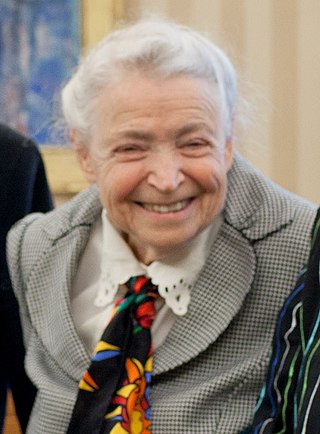
Mildred Dresselhaus, known as the "Queen of Carbon Science", was an American physicist, materials scientist, and nanotechnologist. She was an institute professor and professor of both physics and electrical engineering at the Massachusetts Institute of Technology. She also served as the president of the American Physical Society, the chair of the American Association for the Advancement of Science, as well as the director of science in the US Department of Energy under the Bill Clinton Government. Dresselhaus won numerous awards including the Presidential Medal of Freedom, the National Medal of Science, the Enrico Fermi Award, the Kavli Prize and the Vannevar Bush Award.
Phaedon Avouris is a Greek chemical physicist and materials scientist. He is an IBM Fellow and was formerly the group leader for Nanometer Scale Science and Technology at the Thomas J. Watson Research Center in Yorktown Heights, New York. His group conducted early work on carbon nanotubes, including the production the first nanotube transistors.
Paul McEuen is an American physicist. He received his B.S. in engineering physics at the University of Oklahoma (1985), and his Ph.D. in applied physics at Yale University (1991). After postdoctoral work at MIT (1990–1991), he became an assistant professor at the University of California, Berkeley. He moved to Cornell University in 2001, where he is currently the Goldwin Smith Professor of Physics. He is an expert on the electrical property of carbon nanotubes and is a member of the National Academy of Sciences.
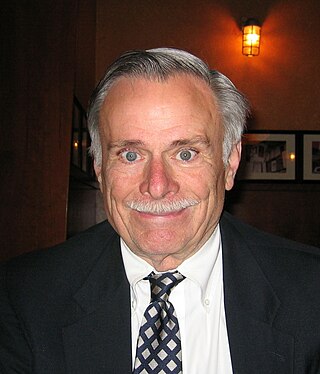
John Stewart Waugh was an American chemist and Institute Professor at the Massachusetts Institute of Technology. He is known for developing average hamiltonian theory and using it to extend NMR spectroscopy, previously limited to liquids, to the solid state. He is the author of ANTIOPE, a freeware general purpose Windows-based simulator of the spectra and dynamics of nuclear magnetic resonance (NMR). He has also used systems of a few coupled spins to illustrate the general requirements for equilibrium and ergodicity in isolated systems.

Cornelis "Cees" Dekker is a Dutch physicist, and Distinguished University Professor at Delft University of Technology. He is known for his research on carbon nanotubes, single-molecule biophysics, and nanobiology.
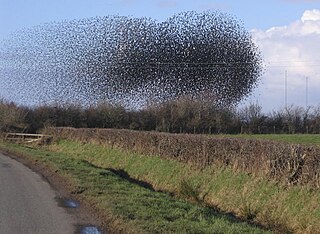
Active matter is matter composed of large numbers of active "agents", each of which consumes energy in order to move or to exert mechanical forces. Such systems are intrinsically out of thermal equilibrium. Unlike thermal systems relaxing towards equilibrium and systems with boundary conditions imposing steady currents, active matter systems break time reversal symmetry because energy is being continually dissipated by the individual constituents. Most examples of active matter are biological in origin and span all the scales of the living, from bacteria and self-organising bio-polymers such as microtubules and actin, to schools of fish and flocks of birds. However, a great deal of current experimental work is devoted to synthetic systems such as artificial self-propelled particles. Active matter is a relatively new material classification in soft matter: the most extensively studied model, the Vicsek model, dates from 1995.
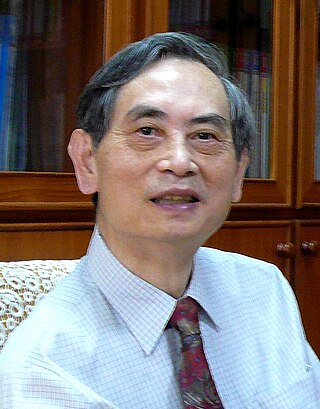
Sow-Hsin Chen, was a Taiwanese physicist and Professor Emeritus at Massachusetts Institute of Technology (MIT). He was a recognized pioneer in the research of the dynamic properties of supercooled and interfacial water with the use of neutron scattering techniques. As an educator, he was recognized for his training of young scientists in the use of those same techniques. Regarding hydrogen storage, his research focused on the use of activated carbon to allow hydrogen to be stored at room temperature.
Nanoreactors are a form of chemical reactor that are particularly in the disciplines of nanotechnology and nanobiotechnology. These special reactors are crucial in maintaining a working nanofoundry; which is essentially a foundry that manufactures products on a nanotechnological scale.
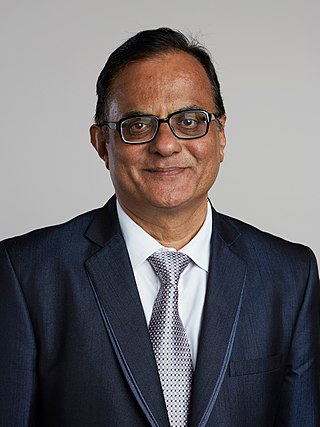
Ajay Kumar Sood is an Indian physicist and researcher currently serving as the 4th Principal Scientific Adviser to the Government of India.
Alan T. Charlie Johnson is an American physicist and a professor in physics and astronomy at the University of Pennsylvania. Johnson currently serves as the founding executive editor of the scientific journal AIP Advances and the co-founder of Graphene Frontiers, LLC.
Michael Steven Strano is an American chemical engineer and the Carbon P. Dubbs Professor of Chemical Engineering at Massachusetts Institute of Technology (MIT). He is particularly interested in quantum-confined materials. Strano was appointed editor-in-chief of Carbon in 2016. In 2017, Strano was elected a member of the National Academy of Engineering "for contributions to nanotechnology, including fluorescent sensors for human health and solar and thermal energy devices."
Miklos Porkolab (born March 24, 1939) is a Hungarian-American physicist specializing in plasma physics.

Pablo Jarillo-Herrero is a Spanish physicist and current Cecil and Ida Green Professor of Physics at Massachusetts Institute of Technology (MIT).

Susan Buthaina Sinnott is professor and head of materials science and engineering at Pennsylvania State University. Sinnott is a fellow of the Materials Research Society (MRS), the American Association for the Advancement of Science (AAAS) and the American Physical Society (APS). She has served as editor-in-chief of the journal Computational Materials Science since 2014.

Prineha Narang is an American physicist and computational material scientist. She is a Professor of Physical Sciences, and Electrical and Computer Engineering, and Howard Reiss Chair at the University of California, Los Angeles (UCLA). Narang currently serves as a U.S. Science Envoy approved by the Secretary of State to identify opportunities for science and technology cooperation. Before moving to UCLA, she was first an Environmental Fellow at Harvard University Center for the Environment and then an Assistant Professor in the John A. Paulson School of Engineering and Applied Sciences at Harvard University. Narang’s work has been recognized internationally by many awards and a variety of special designations, including the Mildred Dresselhaus Prize, the 2021 IUPAP Young Scientist Prize in Computational Physics, a Friedrich Wilhelm Bessel Research Award from the Alexander von Humboldt Foundation, and a Max Planck Sabbatical Award from the Max Planck Society. Narang also received a National Science Foundation CAREER Award in 2020, was named a Moore Inventor Fellow by the Gordon and Betty Moore Foundation for the development for a fundamentally new strategy for single molecule sensing and environmental toxin metrology using picoscale quantum sensors, CIFAR Azrieli Global Scholar by the Canadian Institute for Advanced Research, and a Top Innovator by MIT Tech Review. Narang was awarded a Guggenheim Fellowship in 2023 and elected a Fellow of the American Physical Society (APS) in 2024.
Nirit Dudovich is an Israeli physicist who is the Robin Chemers Neustein Professorial Chair at the Weizmann Institute of Science. Her work considers strong field light-matter interactions and the generation of attosecond pulses. She was elected Fellow of the American Physical Society in 2016.
Gene Frederick Dresselhaus was an American condensed matter physicist. He is known as a pioneer of spintronics and for his 1955 discovery of the eponymous Dresselhaus effect.
Betar Maurkah Gallant is an American engineer who is an associate professor at Massachusetts Institute of Technology. Her research investigates the development of new materials for batteries.
References
- ↑ "Starfish Whisperer Develops a Physical Language of Life". Quanta Magazine. 2023-01-11.
- ↑ "Nikta Fakhri". The Tech. Retrieved 2022-05-06.
- 1 2 Fakhri, Nikta (2011). Single-Walled Carbon Nanotube Dynamics Simple and Complex Media (Thesis). Rice University. hdl:1911/64432. OCLC 1031100026.
- ↑ Fakhri, Nikta (2016). "Life out of equilibrium" (PDF).
- ↑ November 23, 2020: Nikta Fakhri , retrieved 2022-05-06
- ↑ "Nikta Fakhri » MIT Physics". MIT Physics. Retrieved 2022-05-06.
- ↑ "How a starfish egg is like a quantum system". Nature. 580 (7801): 11. 2020-03-26. doi: 10.1038/d41586-020-00881-0 . S2CID 214679634.
- ↑ "The 2016 HFSP Career Development Awards". EurekAlert!. Retrieved 2022-05-06.
- ↑ "Seven MIT researchers win 2017 Sloan Research Fellowships". MIT News | Massachusetts Institute of Technology. 21 February 2017. Retrieved 2022-05-06.
- ↑ "Twelve School of Science faculty members appointed to named professorships". MIT News | Massachusetts Institute of Technology. 19 January 2018. Retrieved 2022-05-06.
- ↑ C6, C6 (2021-02-03). "C6: Awards - IUPAP: The International Union of Pure and Applied Physics" . Retrieved 2022-05-06.
{{cite web}}: CS1 maint: numeric names: authors list (link) - ↑ "NSF Award Search: Award # 1848247 - CAREER: Symmetry and Geometry in Biological Active Matter". www.nsf.gov. Retrieved 2022-05-06.
- ↑ "Nikta Fakhri". www.nasonline.org. Retrieved 2022-05-06.
- ↑ "Early Career Award for Soft Matter Research". www.aps.org. Retrieved 2022-05-06.